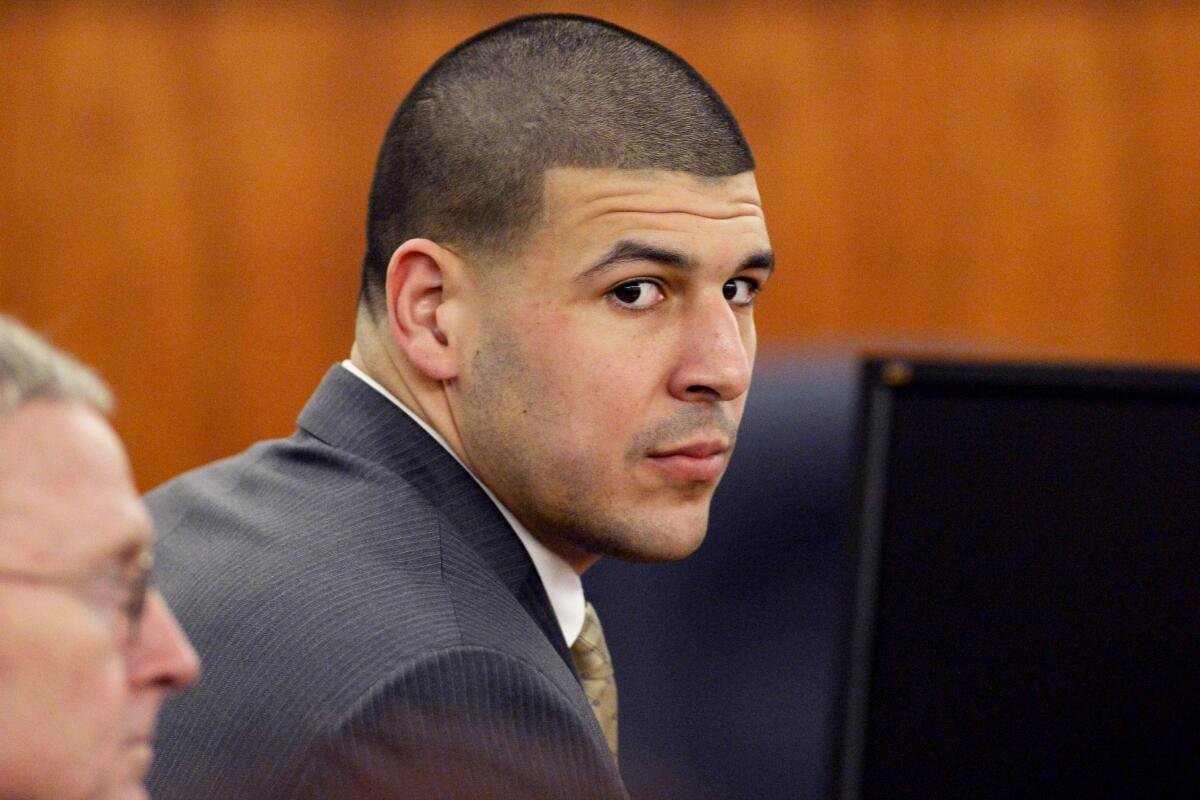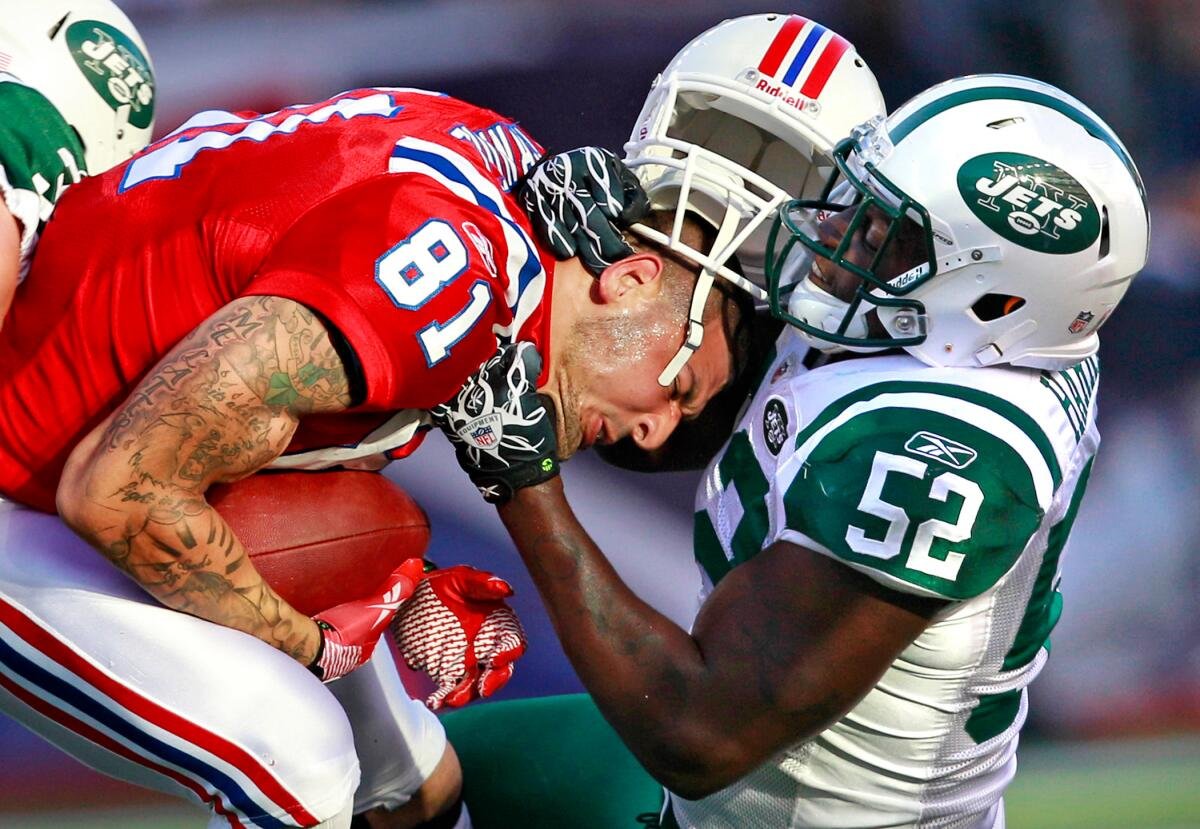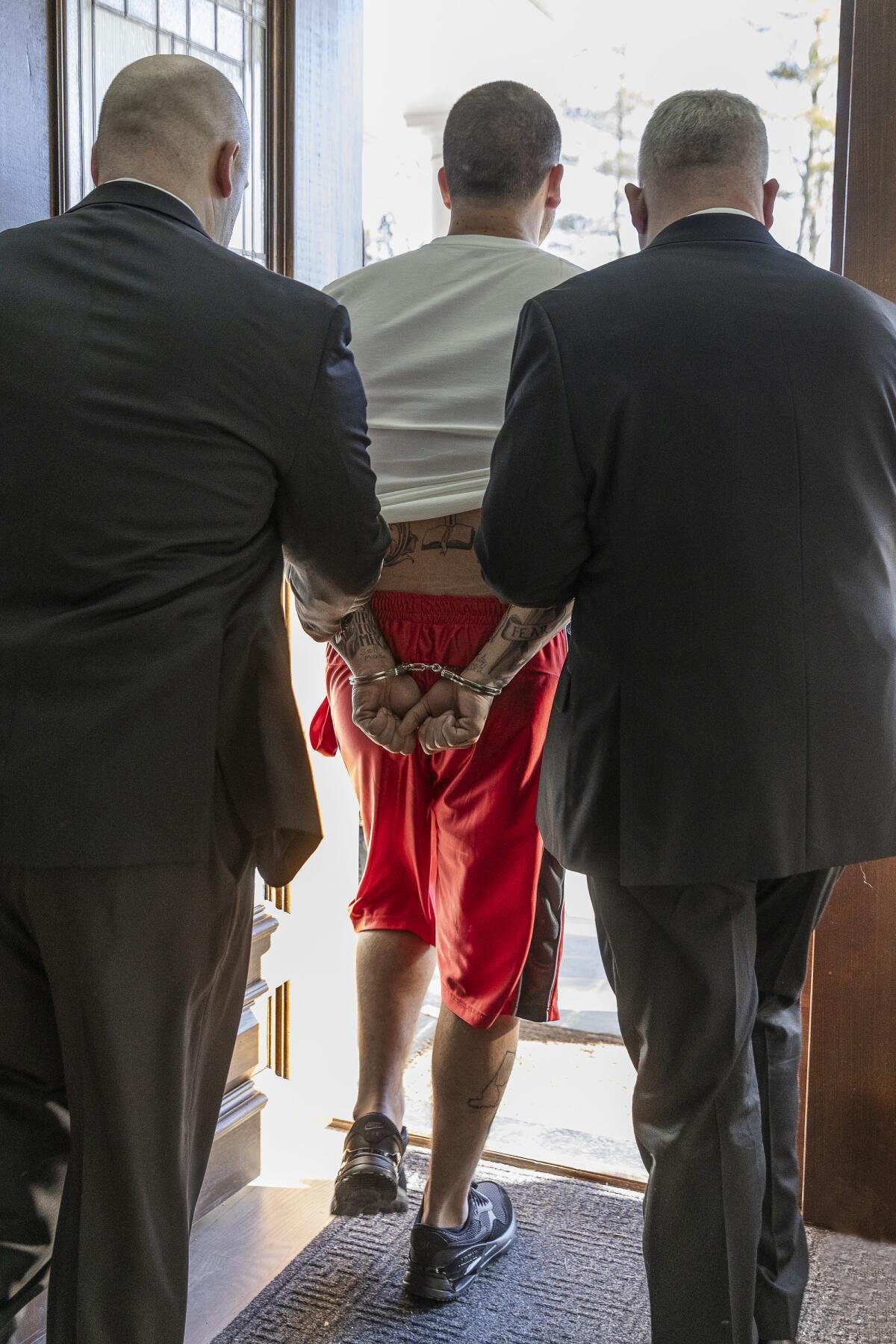In 2009, star tight end Aaron Hernandez helped the Florida Gators win the national championship. In 2012, Hernandez played in the Super Bowl for the New England Patriots and signed a $40 million contract extension.
But in the same year he was investigated for a double murder. A year later he shot Alexander Bradley, one of his best friends in the eye and killed another man, Odin Lloyd. Two years later, Hernandez was found guilty of Odin’s murder, and in 2017 Hernandez committed suicide while in prison.
These are the themes of Hernandez’s short and violent life and death, details that reach beyond the football player and create a hard-to-shake image in popular culture. While it’s clear that Hernandez had drug problems, committed violent crimes and grew up obsessed, his full story is complicated: Hernandez was physically abused in a violent and dysfunctional family; was sexually abused as a boy; he felt compelled by strict social rules to hide his homosexuality; it was chewed up and spit out by the powerhouse of college football; and his brain was severely damaged, resulting in chronic traumatic brain injury, or CTE, which may have affected his behavior.
Those facts and more were discovered and laid out by the Boston Globe’s Spotlight investigative team in 2018, in a series of newspaper articles and a podcast. That was followed by the 2020 Netflix documentary, “Killer Inside: The Mind of Aaron Hernandez.”
1
2

1. Aaron Hernandez in 2009 when he played for Florida. (Dave Martin/Associated Press) 2. In 2015, Hernandez during a jury trial in his murder case. (AP pool)
But these days, most Americans get their information from a series of newspapers, podcasts and documentaries, whether it’s “When They See Us,” Ava DuVernay’s Netflix limited series about the Central Park Five or “Crime Story of America” Saga of OJ Simpson and the murder of Gianni Versace. The team behind “American Crime Story” is currently working on “American Sports Story: Aaron Hernandez,” a 10-part series that chronicles Hernandez’s life and death, according to a Globe report. The limited series will premiere Tuesdays at 10pm on FX with two episodes and streams the following day on Hulu.
Brad Simpson, one of the series’ executive producers, said they were informed by FX executives Nick Grad and John Landgraf that the podcasts were about to be released, so they read the script. of the Globe.
“There was a deep narrative that we wanted to have in our shows, and we started developing this series with an eye toward being part of our different cultures about American culture,” he says. .”
Simpson said that co-executive producer Ryan Murphy liked that this was a story about “someone with a fractured identity, as many of our shows are.”
The report revealed a story that was “more heartbreaking and more complex than I thought,” says Nina Jacobson, one of the executive producers. “When you think you know the story and you come across something that’s documented in depth, it changes your perspective. [and] that makes me always stop and watch.”
He adds that since football is our national religion, the rise and fall of Hernandez “was not the story of one person but it was a mirror back to us as a country.”
Many writers were interested in tackling the story but the producers chose Stuart Zicherman because of his CV – Simpson cites “The Americans” – but also because he is a passionate football fan with an emotional space to see the damage the game can cause. people. Simpson said Zicherman had a strong voice about the intersection of celebrity, sports, sex and men.
He says: “He’s a footballer first and second, and what makes this story different from a million sports stories out there is Aaron’s story with his family, his teammates and coaches. “It becomes a Shakespearean tragedy with strong characters at the center.”
Zicherman says he went in for his first volume with a large scroll that, when unrolled, revealed all the parts of the story. He says: “I like to write about stories that people think they know but actually don’t. “We tend to call people, and Hernandez was a monster, but nobody is born a monster and I wanted to tell that story without apologizing for what he did.”
Zicherman talked about the “American Crime Story” of “taking a crime or an event and making it into something bigger in the fabric of America.”
The show explores toxic masculinity in the home and locker room, how violence on the football field can spill over into everyday life, and how a dysfunctional family can be both a support and a trap.

Aaron Hernandez, left, in 2011 as a tight end for the New England Patriots. After his death, Hernandez was diagnosed with chronic encephalopathy.
(Elise Amendola/Associated Press)
There is also the issue of CTE, which is brain damage caused by repeated blows to the head. “Obviously, we don’t want to say that CTE is what made Aaron a killer – he was exposed to violence and he loved violence – but he became a very strange person with a short temper, ” Zicherman says, noting that Hernandez’s. drug use could also have worsened brain injuries.
He gives the story to show the people and organizations that directly harmed Hernandez or at least failed to “change the story” because of their selfishness, like former Florida coach Urban Meyer, who betrayed Hernandez and his family for the promises he made. ‘t save and pushed the guy out the door when he became a challenge.
“We make products out of our athletes and we don’t always see what’s best for them,” Zicherman says. “The Patriots were also blindsided by his talent.
“But I also want the audience to see that there’s a bigger picture here and that we’re all in this together – promoting our athletes and paying them big and building them up as heroes,” he says, just to change. on them when things go wrong.
Outside of the big picture, Zicherman focused on Hernandez’s story as someone “trying to find his identity,” giving him an explanation as Hernandez jumped from childhood to high school to Florida, the NFL and finally the world of drugs and crime has eaten him. “He’s finally fed up with all the secrets he’s been keeping.”
Zicherman said the Globe’s Spotlight team not only provided a careful and thorough story, but allowed him to come to Boston “to ask a million questions” and visit the writers’ room to answer more. . “They had talked to everybody and done the work, and they helped them a lot,” he says.
But journalists and filmmakers are at a loss as to what they can clearly prove. Zicherman said the series defied the stereotypes, but they felt they had to go further than the Spotlight series.

Josh Rivera as Aaron Hernandez, who was convicted of murdering Odin Lloyd, in a clip from “American Sports Story.”
(Eric Liebowitz/FX)
He says: “In the writers’ room we spent a lot of time gathering information and trying to understand the logic of why things happen and provide answers to them.
The most important thing was to explain why Hernandez killed Lloyd. “It always bothered me that in all the research no one knew,” Zicherman says. “It was a desperate effort that didn’t seem premeditated and didn’t make sense.”
Theories include that Hernandez wanted to cover up his sexuality or involvement in the double murder, but Zicherman thinks it was about how low Hernandez is.
“I’m determined to kill all season long,” Zicherman says. “Hernandez is hiding a lot of secrets and he’s got it off his back with drug use, and he’s nervous as hell because he’s taken so many blows to the head. It’s all those things that don’t add up; I don’t think it was a thing. only one. “
Outside of the draft, the most important point would be to throw Hernandez. Here, the team got lucky. Jacobson was producing “The Hunger Games: The Ballad of Songbirds and Snakes” and watched Josh Rivera at work. “I saw exactly what he was made of,” he says of Rivera, who previously played the role of Chino in Steven Spielberg’s “West Side Story.” “He’s an incredibly complex player, determined to grow, natural and interesting. And he was like that all the time. ”
But while Jacobson was being sold, he also trusted Murphy’s judgment and wanted to allow a review “to see if Ryan will float to the top”.
At the end of the callbacks, after mixing and matching the actors vying for the various roles, Murphy turned around and said, “It’s obviously Josh,” so they called him back before he walked out. in the examination.
Zicherman says that many other actors have suppressed the violence and the darkness, but Rivera “played vulnerability and other parts of emotion and inner feelings. Once we were with him I started stripping the dialogue to let time play on his face – the other players could talk and we could watch his heartache.”
(Rivera, he adds, is also “a goofball who likes to sing and dance and make jokes,” and that Hernandez, before things went wrong, was a bandleader.)
Rivera is present in almost every area. Simpson admits that she had to exercise regularly to stay big and endure long hours of makeup for her tattoos. “He handled it really well, and he was always playful and enthusiastic,” says Simpson. who as a person. He set the tone for the set.”
Simpson remembers just one day where Rivera was, understandably, overworked. “We were on a muddy field at 3 in the morning rehearsing the murder of Odin Lloyd, and there was a moment where Josh had to stop. He turned to everyone and said, ‘This is I’m so sorry,’ ” Simpson says. “I think we were all in awe of that moment.”
#American #Sports #Story #Aaron #Hernandez #violence #drugs #football #created #monster